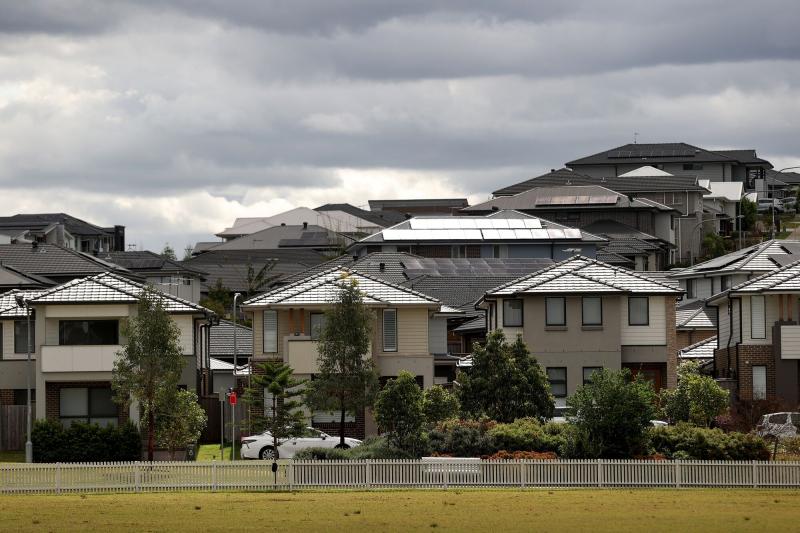Australian house prices declined for the first time in 22 months last month as buyers increasingly found themselves priced out of the market, while the supply of properties increased.
The Home Value Index for major cities slid 0.2 percent for its first fall since February 2023, property consultancy CoreLogic Inc said yesterday. Melbourne and Sydney, the two biggest markets, led the declines with drops of 0.7 percent and 0.6 percent respectively.
On the other side of the country, Western Australia’s state capital Perth led gains with a 0.7 percent increase, followed by the southern city of Adelaide, up 0.6 percent. Those two cities also recorded the largest annual gains of 19.1 percent and 13.1 percent respectively. Yet even here the pace of appreciation had slowed in recent months.

Photo: Bloomberg
“Growth in housing values has been consistently weakening through the second half of the year, as affordability constraints weighed on buyer demand and advertised supply levels trended higher,” said CoreLogic research director Tim Lawless said.
“With worsening affordability constraints and reduced borrowing capacity, we have seen buyer demand pushed toward lower-priced markets,” he said.
Higher interest rates, a shortage of homes and booming population growth have triggered a housing crisis in parts of Australia. The problem has been particularly acute in Sydney where buyers are being priced out of the market given an average home costs 13 times income.
Yet costs have now reached such a level that, combined with interest rates at a 13-year high of 4.35 percent, buyers are simply unable to raise the funds required to purchase a home. As a result, rents have also soared, though that market also ended the year on a softer note, CoreLogic said, citing a rise in the size of households in major cities and a cooling in migration.
“The final months of 2024 have set the framework for a soft start to 2025,” CoreLogic said. “However, as with 2024, we could likely see another year of multi-speed conditions, with the potential for a modest rebound in value growth once interest rates start coming down.”

TAKING STOCK: A Taiwanese cookware firm in Vietnam urged customers to assess inventory or place orders early so shipments can reach the US while tariffs are paused Taiwanese businesses in Vietnam are exploring alternatives after the White House imposed a 46 percent import duty on Vietnamese goods, following US President Donald Trump’s announcement of “reciprocal” tariffs on the US’ trading partners. Lo Shih-liang (羅世良), chairman of Brico Industry Co (裕茂工業), a Taiwanese company that manufactures cast iron cookware and stove components in Vietnam, said that more than 40 percent of his business was tied to the US market, describing the constant US policy shifts as an emotional roller coaster. “I work during the day and stay up all night watching the news. I’ve been following US news until 3am

Six years ago, LVMH’s billionaire CEO Bernard Arnault and US President Donald Trump cut the blue ribbon on a factory in rural Texas that would make designer handbags for Louis Vuitton, one of the world’s best-known luxury brands. However, since the high-profile opening, the factory has faced a host of problems limiting production, 11 former Louis Vuitton employees said. The site has consistently ranked among the worst-performing for Louis Vuitton globally, “significantly” underperforming other facilities, said three former Louis Vuitton workers and a senior industry source, who cited internal rankings shared with staff. The plant’s problems — which have not

TARIFF CONCERNS: The chipmaker cited global uncertainty from US tariffs and a weakening economic outlook, but said its Singapore expansion remains on track Vanguard International Semiconductor Corp (世界先進), a foundry service provider specializing in producing power management and display driver chips, yesterday withdrew its full-year revenue projection of moderate growth for this year, as escalating US tariff tensions raised uncertainty and concern about a potential economic recession. The Hsinchu-based chipmaker in February said revenues this year would grow mildly from last year based on improving supply chain inventory levels and market demand. At the time, it also anticipated gradual quarter revenue growth. However, the US’ sweeping tariff policy has upended the industry’s supply chains and weakened economic prospects for the world economy, it said. “Now

UNCERTAINTY: Innolux activated a stringent supply chain management mechanism, as it did during the COVID-19 pandemic, to ensure optimal inventory levels for customers Flat-panel display makers AUO Corp (友達) and Innolux Corp (群創) yesterday said that about 12 to 20 percent of their display business is at risk of potential US tariffs and that they would relocate production or shipment destinations to mitigate the levies’ effects. US tariffs would have a direct impact of US$200 million on AUO’s revenue, company chairman Paul Peng (彭雙浪) told reporters on the sidelines of the Touch Taiwan trade show in Taipei yesterday. That would make up about 12 percent of the company’s overall revenue. To cope with the tariff uncertainty, AUO plans to allocate its production to manufacturing facilities in